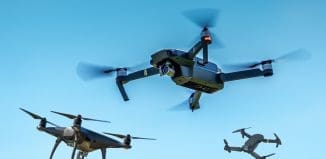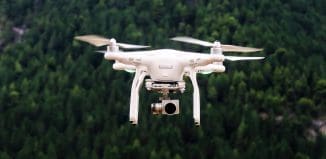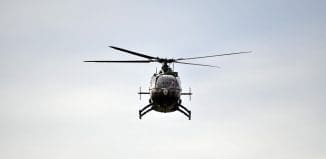The Future of the IDF: Robot Soldiers and UAV Swarms
This post is also available in:  עברית (Hebrew)
עברית (Hebrew)
 In 20 years the Israeli military will be completely different. Almost everything will change, including enlistment methods and general structure and especially the Air Force and communication systems. The cause: Intense use of unmanned vehicles and satellites.
In 20 years the Israeli military will be completely different. Almost everything will change, including enlistment methods and general structure and especially the Air Force and communication systems. The cause: Intense use of unmanned vehicles and satellites.
This according to academic research presented yesterday at the annual INSS Conference in Tel Aviv, by Tel Aviv University’s Professor Asher Tischler and INSS senior researcher Col. (Res.) Yoav Zachs.
Nobel Prize winner Professor Israel Oman, from the Hebrew University in Jerusalem, presented a theoretical and moral aspect of unmanned systems: “Weapons are there not to be used. When the enemy knows you have these weapons he might not attack. So it is with unmanned systems: They exist in order to deter the enemy from attacking. If we start using a system that will respond autonomously and automatically to every rocket launch, making this public knowledge, the enemy might be deterred if it knows that our response will be automatic.”
Professor Asher Tischler presented academic research focusing on the IDF in the years 2020-2025, when the use of unmanned systems becomes much more prevalent. IDF enlistment methods, the structure of Air Force weapons systems and military communication systems structure – all be be affected.
- Enlistment: More quality soldiers will be needed, in addition to lower demand for combat soldiers. A smaller number of soldiers will operate a larger number of systems. The IDF will need more soldiers with technological backgrounds, a need which is already felt today.
- Air Force: Relatively low-cost missiles (100,000-200,000 dollars) will be able to destroy fighter jets. Satellites and small UAVs will be able to gather intelligence and hit targets from very long ranges. In many cases they’ll be able to replace F-15, F-16 and F-35 fighter jets, although other missions will still require manned aircraft. “We believe that the Hezbollah weapons problem in Lebanon could be solved in a fraction of the cost compared to that of the solution today – attacking with manned fighters jets, which are horribly expensive.”
- Communication systems: New communication systems will be needed, systems that will be able to connect to a very high number of autonomous systems.
Col. (Res.) Yoav Zachs presented a research conducted by dozens of experts. The main conclusions: In 20 years unmanned systems will autonomously plan military operations. Autonomous systems will also be able to carry out these mission, in addition to many civilian uses. Many military missions in the near future will be carried out by large groups of UAVs, called swarms.
IHLS – Israel Homeland Security
According to the research military intelligence must prepare itself for deep integration of unmanned vehicles in intelligence gathering, in order to receive real time information from every location on Earth. The state itself will have to develop new procedures for large-scale operation of unmanned systems. The government will have to make clear decisions on the matter, new government organizations will have to be established, focusing on training and international cooperation. This will have an impact on economics, law and ethics as well.
Yoav Zachs and Prof. Tischler conclude: “We have to start now if we want to achieve everything in 20 years.”
Mathematician and Nobel Prize winner Professor Israel Oman reviewed similar technology changes in the past: In all the years of the cold war the U.S. and the U.S.S.R never used nuclear weapons against each other, all in accordance with the principle of mutually assured destruction. Another example: Some researchers believe that Reagan’s Star Wars project was among the reasons for the breakdown of the U.S.S.R, as the project was supposed to neutralize soviet missile attacks while the soviets themselves had no such defense system.
The same goes for autonomous, unmanned systems: “When the enemy knows we have an automated defense system in place and that there’s no way to stop it – it’s a serious element of deterrence.”
When asked about the moral aspects of using unmanned systems, Oman answered: “If the military action itself is moral, carrying it out by using unmanned systems is equally moral.”




























